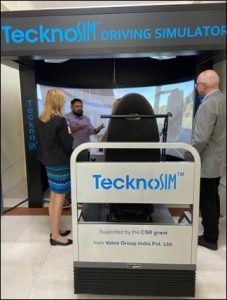
The bus simulator at the Centre for infrastructure, Sustainable Transportation and Urban Planning (CiSTUP) was manufactured by Tecknotrove Systems (I) Pvt Ltd and is supported by the CSR (corporate social responsibility) grant from the Volvo Group India Pvt Ltd.
The simulator will be used for a multitude of India-focussed experiments. However, the plan is to start with two studies. Based on real-world data captured from sensors (including cameras), scenarios will be designed to replicate Indian driving conditions. These scenarios would be used as learning material to train drivers on how to respond to events that occur commonly on Indian roads (for instance, two-wheelers overtaking from the wrong side, vehicles driving in blind-spots, and more).
Behavioural experiments will be conducted, wherein drivers will be brought to the lab, presented with scenarios, and their responses to simulated traffic events observed. The data on participants’ driving behaviour (for example, speeding/braking, gear-shifting, and more) will be captured, and this data will be analysed using methods from data science and machine learning. Such analysis will provide better insights into the psyche/behaviour of Indian drivers. In the near future, there is a plan to capture the drivers’ body posture and gaze, to understand how these factors together with driver behaviour correlate with drivers’ susceptibility to getting into accidents.
The experiments would also allow the evaluation of usability/usefulness of the currently available ADAS (advanced driver-assistance system) and propose new India-focussed ADAS systems.